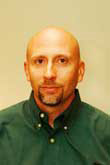KEEP AMERICA PURE
WITH
LIBERTY PAINTS
The exchange between the main character and his supervisor, Kimbro, when the main character is first learning his job is important at this moment in the history of U.S. public education:
"'Now get this straight,' Kimbro said gruffily . 'This is a busy department and I don't have time to repeat things. You have to follow instructions and you're going to do things you don't understand, so get your orders the first time and get them right! I won't have time to stop and explain everything. You have to catch on by doing exactly what I tell you. You got that?'"
What follows is the main character being told by Kimbro that Liberty Paints' prize item, white paint, requires ten drops of black. The process makes no sense on many levels to the main character, but he is chastised for questioning doing his job as told:
"'That's it. That's all you have to do,' [ Kimbro ] said. 'Never mind how it looks. That's my worry. You just do what you're told and don't try to think about it.'"
The scenes that follow include the main character being reprimanded for a decision although the compared paint samples look identical--the only difference being one is the result of his choice and the other is the work of the supervisor. (Later, Ellison examines the role of unions at the plant, also sections valuable to the debates today.)
But for now, I want to emphasize that this scene from Invisible Man is little different from the accountability dynamic begun in the early 1980s. For nearly three decades teachers have been mandated to implement standards and to prepare students for tests that those teachers did not create and often do not endorse. Like the main character in Invisible Man, they are told daily, "You just do what you're told and don't try to think about it."
And like the main character above, they are now being held accountable for the results--disregarding the power structure that mandates the standards and the tests, disregarding the weight of evidence that shows test scores are more strongly aligned with poverty than teacher or school quality .
The question of power in the U.S. is that voice, thus power, comes from wealth and status.
At the end of his ordeal, the main character in Invisible Man has been rendered not only silent but also invisible. He hibernates and fights a covert battle with the Monopolated Light & Power company by living surrounded by 1369 lights. His story is a question of power, a struggle to bring the truth to light.
In 2011, teachers, educators, scholars, and everyone concerned about democracy and freedom must reject the urge to hibernate and wage silent battles. Instead, voices must be raised against the powerful who have now set their sights on teachers, schools, students, and ultimately the majority of us standing on the other side of the widening gap between the haves (who have their voices amplified) and the have nots (who are silenced, invisible).
(Note: You can view every article as one long page if you sign up as an Advocate Member, or higher).





